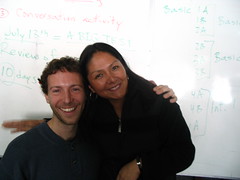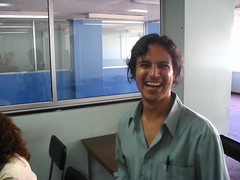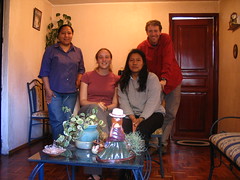Silvia
Silvia joined my class back in February as part of the Preeti Wedding Migration. For those who don’t know, one of the other SECAP teachers, named Preeti, went to New York and Nepal and maybe some other countries — I don’t remember — for her wedding. Yes. Her wedding. She got married, had a honeymoon and returned to Ecuador. But she missed a month of teaching, and so during her month gone, her students joined up with me and Westra.
So Silvia joined my class then, along with about nine others from Preeti’s classes. After Preeti returned, the Great Shift happened. The Great Shift was when Westra and I united classes despite our original plan of just keeping Preeti’s students. See previous posts.
Anyhow. Most of Preeti’s students went back to Preeti days after the Great Shift. Silvia was one of them. But a month later she returned to class. I didn’t inquire why. Preeti said she was close to failing, which I can understand given her habit of arriving really late on a regular basis, but she does fine in class, has the ganas, etc.
She’s actually a lot of fun. She and I tease each other almost once a day. She loves getting me to blush and then saying (in Spanish), why are you blushing? She’s also really open about being attracted to me, which is unlike women in the states. It’s not that she flirts and is trying to win me over; in fact, it’s more of a “too bad you’re already taken” sort of thing. For example, when she heard my brother was coming to visit, she kept nagging me to bring him to class. I think she even said once, “is your brother as good-looking as you?”
Unfortunately, she couldn’t make it to the park on the one day when I was able to drag Will along to a class-related outing.
I’m posting Silvia today, because it’s her birthday. According to her, she was born in 2000.




